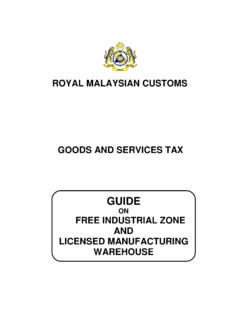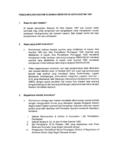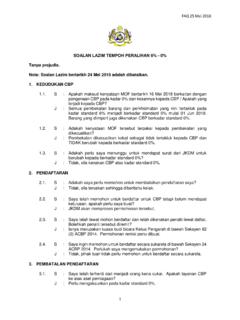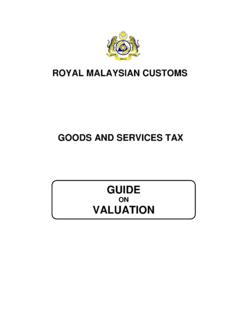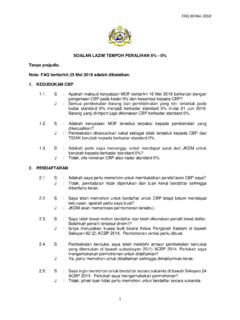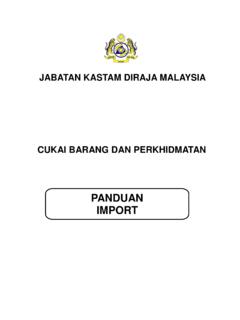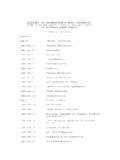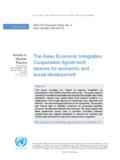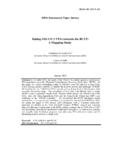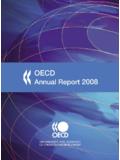Transcription of M A L A Y S I A Warta Kerajaan - customs.gov.my
1 Jil. 52No. 26 M A L A Y S I AWarta KerajaanS E R I P A D U K A B A G I N D ADITERBITKAN DENGAN KUASAHIS MAJESTY S GOVERNMENT GAZETTEPUBLISHED BY AUTHORITY31hb Disember 2008 TAMBAHAN No. 148 PERUNDANGAN (A) (A) KASTAM 1967Pe r i n t a h Du t i Ka s t a m (Ba r a n g-Ba r a n g Di Ba w a h Pe r j a n j i a nPe rKo n g s i a n eKo n o m i Ko m r e h e n s i f an t a r a ne g e r i-ne g e r ian g g o t a ASEAN De n g a n jePu n) 2008 PaDa menjalankan kuasa yang diberikan oleh subseksyen 11(1) Akta Kastam 1967 [Akta 235], Menteri membuat perintah yang berikut:Nama dan permulaan kuat kuasa1. (1) Perintah ini bolehlah dinamakan Perintah Duti Kastam (Barang-Barang di bawah Perjanjian Perkongsian Ekonomi Komprehensif Antara Negeri-Negeri Anggota ASEAN dengan Jepun) 2008. (2) Perintah ini mula berkuat kuasa pada 1 Februari Dalam Perintah ini, melainkan jika konteksnya menghendaki makna yang lain AJCEP ertinya Perkongsian Ekonomi Komprehensif ASEAN Jepun; negeri ASEAN ertinya Brunei, Kemboja, Indonesia, Laos, Malaysia, Myanmar, Filipina, Singapura, Thailand atau Vietnam, mengikut mana-mana yang berkenaan, dan negeri-negeri ASEAN hendaklah ditafsirkan dengan (A) Import 3.
2 (1) Tertakluk kepada peruntukan Jadual Pertama, duti import hendaklah dilevi ke atas, dan dibayar oleh pengimport, berkenaan dengan barang-barang yang dinyatakan dalam Jadual Kedua, yang berasal dari negeri Jepun atau negeri-negeri ASEAN, mengikut kadar duti import yang dinyatakan dalam ruang (4) Jadual Kedua, yang diimport ke Malaysia. (2) Jika suatu kadar duti import dinyatakan dalam ruang (4) Jadual Kedua berkenaan dengan sesuatu jenis barang-barang yang tertentu maka kadar itu hendaklah dilevi ke atas dan hendaklah dibayar oleh pengimport sebagai ganti duti import penuh yang sepadan yang dikenakan di bawah Perintah Duti Kastam 2007 [ (A) 441/2007], hanya berkenaan dengan barang-barang dari jenis yang dibuktikan hingga memuaskan hati Ketua Pengarah sebagai berasal dari negeri Jepun atau negeri-negeri ASEAN.
3 (3) Dalam hal barang-barang yang boleh dikenakan duti import di bawah Perintah Duti Kastam 2007 yang diimport pada atau dengan mana-mana orang yang memasuki Malaysia atau dalam bagasi orang itu dan yang dimaksudkan untuk kegunaan bukan komersial (kecuali kenderaan bermotor, minuman beralkohol, spirit, tembakau dan rokok) hanya duti kastam pada kadar sama rata 30% ad valorem hendaklah dilevi ke atas dan dibayar oleh orang itu atas barang-barang itu. (4) Berhubung dengan barang-barang yang tidak dinyatakan dalam Jadual Kedua, duti import hendaklah dilevi ke atas barang-barang itu mengikut kadar penuh yang dinyatakan dalam Perintah Duti Kastam kadar yang dinyatakan dalam Jadual Kedua4. Melainkan jika dinyatakan selainnya, kadar yang dilevi di bawah subperenggan 3(1) hendaklah mengikut kiraan peratusan nilai barang-barang5.
4 Penjenisan barang-barang dalam Jadual Kedua hendaklah mematuhi Rukun tafsiran Jadual dalam Perintah Duti Kastam ACT 1967Cu s t o m s Du t i e s (go oDs u nDe r ag r e e m e n t o n Co mPr e h e n s i v e eCo n o m iC Pa r t n e r s h iP am o n g me mBe r st a t e s o f t h e ASEAN a nD jaPa n) orDe r 2008In exercise of the powers conferred by subsection 11(1) of the Customs Act 1967 [Act 235], the Minister makes the following order:Citation and commencement1. (1) This order may be cited as the Customs Duties (Goods under agreement on comprehensive economic partnership among Member States of the ASEAN and japan ) Order (A) 476. (2) This Order comes into operation on 1 February In this Order, unless the context otherwise requires AJCEP means ASEAN- japan comprehensive economic partnership ; ASEAN country means Brunei, Cambodia, Indonesia, Laos, Malaysia, Myanmar, Philippines, Singapore, Thailand or Vietnam, as the case may be and ASEAN countries shall be construed Duty3.
5 (1) Subject to the provisions of the First Schedule, import duty shall be levied on, and paid by the importer, in respect of goods specified in the Second Schedule, originating from japan or ASEAN countries, at the rate of import duty specified in column (4) of the Second Schedule, imported into Malaysia. (2) Where an import rate of duty is specified in column (4) of the Second Schedule in respect of a particular class of goods such rate shall be levied on and shall be paid by the importer in lieu of the corresponding full import duty imposed under the Customs Duties Order 2007 [ (A) 441/2007] only in respect of goods of the class which are shown to the satisfaction of the Director General to have originated from japan or ASEAN countries. (3) In the case of those goods liable to import duty under the Customs Duties Order 2007 imported on or with any person entering Malaysia or in the baggage of such person and is intended for non-commercial use (except motor vehicles, alcoholic beverages, spirits, tobacco and cigarettes) only a customs duty at a flat rate of 30% ad valorem shall be levied on and paid by such person on such goods.
6 (4) In relation to goods not specified in the Second Schedule, import duties on such goods shall be levied at the full rates specified in the Customs Duties Order of rates shown in the Second Schedule4. Unless otherwise specified, the rates levied under subparagraph 3(1) shall be expressed as the percentage of the value of of goods5. The classification of goods in the Second Schedule shall be governed by the Rules for the interpretation of the Schedules in the Customs Duties Order 2007. (A) a l Pe r t a m a/Fi r s t sc h e d u l e[Subperenggan 3(1)/Subparagraph 3(1)]Pa r t 1 RULES OF ORIGIN UNDER THE agreement ON comprehensive economic partnership among MEMBER STATES OF THE ASEAN AND JAPANIn determining the origin of products eligible for the preferential tariff concession pursuant to the agreement between the Government of ASEAN and Government of japan for comprehensive economic partnership (hereinafter referred to as the agreement ), the following Rules shall be applied: Rule 1: DefinitionsFor the purposes of this Order: (a) exporter means a natural or juridical person located in an exporting Party who exports a good from the exporting Party.
7 (b) factory ships of the Party or vessels of the Party respectively means factory ships or vessels: (i) which are registered in the Party; (ii) which sail under the flag of the Party; (iii) which are owned to an extent of at least fifty (50) per cent by nationals of one or more of the Parties, or by a juridical person with its head office in a Party, of which the representatives, chairman of the board of directors, and the majority of the members of such board are nationals of one or more of the Parties, and of which at least fifty (50) per cent of the equity interest is owned by nationals or juridical persons of one or more of the Parties; and (iv) of which at least seventy-five (75) per cent of the total of the master, officers and crew are nationals of one or more of the Parties; (c) generally accepted accounting principles means the recognised consensus or substantial authoritative support in a Party, with respect to the recording of revenues, expenses, costs, assets and liabilities; the disclosure of information; and the preparation of financial statements.
8 These standards may encompass broad guidelines of general application as well as detailed standards, practices and procedures; (d) good means any merchandise, product, article or material; (e) identical and interchangeable materials means materials being of the same kind and commercial quality, possessing the same technical and physical characteristics, and which once they are incorporated into the good cannot be distinguished from one another for origin purposes by virtue of any markings; (f) importer means a natural or juridical person who imports a good into the importing Party; (A) 476. (g) materials means any matter or substance used or consumed in the production of a good, physically incorporated into a good, or used in the production of another good; (h) originating good or originating material means a good or material that qualifies as originating in accordance with the provisions of this Order; (i) packing materials and containers for transportation and shipment means the goods used to protect a good during its transportation and shipment, different from those containers or materials used for its retail sale; (j) preferential tariff treatment means the rate of customs duties applicable to an originating good of the exporting Party in accordance with paragraph 1 of Article 16 of the agreement .
9 And (k) production means methods of obtaining a good including growing, mining, harvesting, raising, breeding, extracting, gathering, collecting, capturing, fishing, trapping, hunting, manufacturing, processing or 2: Originating Goods For the purposes of this Order, a good shall qualify as an originating good of a Party if it: (a) is wholly obtained or produced entirely in the Party as provided for in Rule 3; (b) satisfies the requirements of Rule 4 when using non-originating materials; or (c) is produced entirely in the Party exclusively from originating materials of one or more of the Parties,and meets all other applicable requirements of this 3: Goods Wholly Obtained or Produced For the purposes of paragraph (a) of Rule 2, the following shall be considered as wholly obtained or produced entirely in a Party: (a) plant and plant products grown and harvested, picked or gathered in the Party; Note: For the purposes of this paragraph, the term plant refers to all plant life, including fruit, flowers, vegetables, trees, seaweed, fungi and live plants.
10 (b) live animals born and raised in the Party; Note: For the purposes of paragraphs (b) and (c), the term animals covers all animal life, including mammals, birds, fish, crustaceans, molluscs, reptiles, bacteria and (A) 476. (c) goods obtained from live animals in the Party; (d) goods obtained from hunting, trapping, fishing, gathering or capturing conducted in the Party; (e) minerals and other naturally occurring substances, not included in paragraphs (a) through (d), extracted or taken from soil, waters, seabed or beneath the seabed of the Party; (f) goods taken from the waters, seabed or beneath the seabed outside the territorial waters of the Party, provided that the Party has the rights to exploit such waters, seabed and beneath the seabed in accordance with its laws and regulations and international law; Note: Nothing in this Order shall affect the rights and obligations of the Parties under international law, including those under the United Nations Convention on the Law of the Sea.
